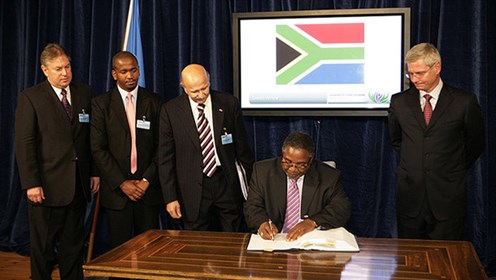13 August 2014
South African member Ceasefire calls on country to ratify international cluster bomb ban
Ahead of an international meeting on the 2008 Convention on Cluster Munitions, expectations are on South Africa to expedite ratification of the key humanitarian disarmament treaty.

South Africa at 2008 Oslo CCM signing
South Africa signed the Convention on Cluster Munitions on 3 December 2008 – the earliest opportunity available under the then newly adopted treaty. Six years on, South Africa has yet to ratify the convention but still has an opportunity finalise the process before the international meeting of the treaty in Costa Rica next month.
“We have three weeks to finalise the ratification process in order to promote South Africa’s credentials as a nation that takes the protection of civilians seriously,” said Kennedy Mabasa, Executive Director of South African NGO Ceasefire, a member of the international Cluster Munition Coalition. “Alternatively representatives will attend the key September meeting having to explain, for the sixth year running, why South Africa has not finalised domestic procedures to ratify the treaty.”
South Africa is a former user and producer of cluster munitions, and it is one of 113 states to have joined the 2008 treaty banning the weapons in recognition of the devastating harm posed to civilians.
There is cross-party support in South Africa for ratification of the treaty; cabinet approved the ratification on 5 September 2013, and procedural processes were expected to be complete before national elections this year.
At a 2013 regional meeting of African states held in Lome, Togo, representatives of South Africa stated, “These weapons have not only become obsolete as weapons of modern warfare, but their recent use in conflicts has shown them to cause unacceptable harm to civilians, even long after cessation of active hostilities…we deplore any use of cluster munitions by any state.”
Cluster munitions are currently being used in Syria, with attacks reported in over 224 locations across the war torn country since July 2012. Cluster munition strikes on residential areas, on schools, and even playgrounds, have indiscriminately killed and injured civilians, including children. Use of the weapon in the Syria conflict creates further urgency for South Africa to ratify the treaty, and to encourage the remaining non-signatory states to join without delay.
Over 100 countries are expected to participate in the Fifth Meeting of States Parties to the Convention on Cluster Munitions taking place in San Jose, Costa Rica 2-5 September. The International Committee of the Red Cross, United Nations agencies, and civil society representatives including survivors will also participate in the annual convention meeting.
As a result of the treaty, stockpiles of the weapon are being destroyed in record numbers, hundreds of km2 of land have been cleared and assistance provisions enshrined for cluster munition victims. The global stigma today against cluster munitions is strong, to the point that even countries outside the treaty condemn use of the weapon.
“This is what the founding father of democratic South Africa, Tata Mandela, expects from this nation,” Mabasa said.
“Never again shall South Africa be the fountainhead of conflict in the region and further afield. Never again shall our country be the source of armaments used to suppress our neighbours. Never again shall we spend our people’s resources to develop weapons of mass destruction.”
- President Nelson Mandela, March 1995


